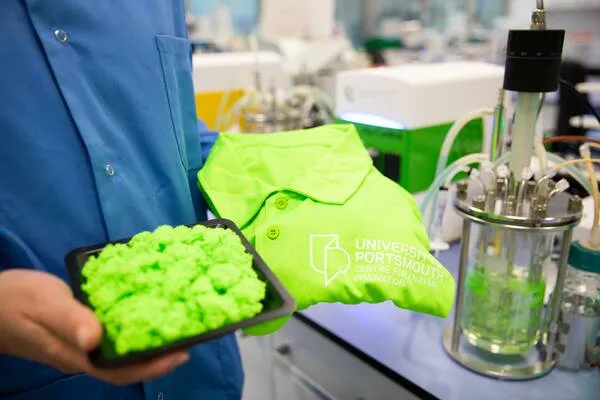Polyester is the most widely-used clothing fiber in the world. However, it is currently not a sustainable textile option. As a result, this fiber will likely end up discarded in a landfill or polluting the environment. Polyethylene terephthalate (PET) is the main ingredient. It is one of the most common consumer plastics.
Researchers at the University’s Centre for Enzyme Innovation have already developed enzyme technology to reduce single-use plastics, including PET, to their chemical building blocks, leading to safe and energy-efficient recycling. Now they have set their sights on creating a similar process for polyester textiles.
The process of recycling synthetic fabrics using enzymes will not be an easy one. It is estimated that these textiles account for 60 percent of clothes that are worn (EEA (2021) Plastic in textiles: towards a circular economy for synthetic textiles in Europe), and are often chosen for durability.

Why These Enzymes Are Important
The addition of dyes and other chemical treatments makes it even harder for these natural processes to “digest” these tough oil-based materials. Developing enzymes that can efficiently “eat” polyester clothing without energy-intensive pre-treatment is the biggest challenge.
Find out why circular fashion is so important.
Professor Andy Pickford, Director of the Centre for Enzyme Innovation at the University of Portsmouth said:
“We will develop enzymes that can deconstruct the PET in waste textiles. Tolerating the challenges that this feedstock poses, namely its toughness and the presence of dyes and additives.
“We will test the compatibility of our engineered enzymes with additives, dyes and solvents. To select those enzymes that are best suited to polyester textile deconstruction. Then we will apply these enzymes to appropriately pretreated waste polyester textiles. In laboratory-scale bioreactors to evaluate the potential and limitations of scaling up the technology.”
Clothing has some of the lowest rates of recycling
Most clothes go to incineration plants or to landfills. It is possible to turn good quality oil-based textiles into carpets and other products. However, current recycling methods are highly energy intensive. Scientists hope that enzymes developed at the University of Portsmouth will help them create an environmentally-friendly circular economy for plastic-based clothing.
Some principles of sustainable fashion you can apply to your own life.
Professor Pickford said:
“Our research will establish the feasibility of using enzymes to deconstruct the PET in waste textiles into a soup of simple building blocks for conversion back into new polyesters. Thus reducing the need to produce virgin PET from fossil-fuel based chemicals. This will enable a circular polyester textiles economy and ultimately reduce our dependence on taking oil and gas out of the ground.”
“We want a system that uses plastic in the same way we use glass or tin cans – infinitely recycled. The ultimate aim is to close the loop. However, this requires not only the technology but also the will to do so.“
What The Research On Enzymes Shows
The research, which is funded by the Biotechnology and Biological Sciences Research Council (BBSRC), will start at the end of January 2023 and last for 18 months. The university team will work with project partner Biomimicry Institute, which will provide expertise in natural solutions to sustainability challenges. The university will also work Endura Sports clothing, who will share their knowledge of fabric dyes and provide samples of end-of-life polyester textiles.



![women [longevity live]](https://longevitylive.com/wp-content/uploads/2020/01/photo-of-women-walking-down-the-street-1116984-100x100.jpg)










